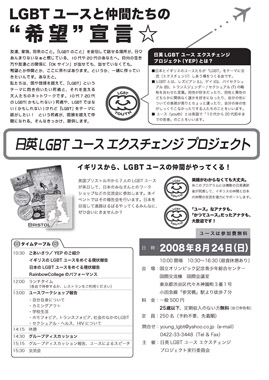Yukiko HOSOMI
Co-ordinator for UK, Japan-UK LGBT Youth Exchange Project
【The article below is the same as the article that appears in the tenth issue of the CGS Newsletter.】
 When it is hard enough to meet other LGBT young people in our own countries, why do we cross over borders trying to meet others who live thousands of miles away? Paradoxically this is the very reason why we are holding this LGBT youth exchange. The exchange creates a space for young people and all involved to find themselves as well as each other in societies where heteronormativity and gender stereotyping attempt to wipe out and disadvantage the existence of any nonconformist. Additionally, being young makes LGBT youth a minority in LGBT communities. While coming-out is still a big issue for most LGBTs, it is even harder for young people to do so when their lives are dependent on parental care. This is still the case, not only in Japan, but also in the UK.
When it is hard enough to meet other LGBT young people in our own countries, why do we cross over borders trying to meet others who live thousands of miles away? Paradoxically this is the very reason why we are holding this LGBT youth exchange. The exchange creates a space for young people and all involved to find themselves as well as each other in societies where heteronormativity and gender stereotyping attempt to wipe out and disadvantage the existence of any nonconformist. Additionally, being young makes LGBT youth a minority in LGBT communities. While coming-out is still a big issue for most LGBTs, it is even harder for young people to do so when their lives are dependent on parental care. This is still the case, not only in Japan, but also in the UK.
However, we do not just cross over to reach each other. In fact, through this exchange, LGBT youth from Japan and the UK try to “cross over” the barriers facing them in society together to envision a society where everyone is respected irrespective of differences in sexual orientation or gender identity. To address the deep-rooted homophobia in society, we need collective remedies. Concern was raised that the project may end up disempowering young Japanese people by positioning the UK as “advanced” and Japan as “backward.” However, if we place ourselves in this collective challenge, a mere comparison of two countries does not mean anything. The exchange is not about “comparison” which is only possible from the position of observers without engagement. Contrary to this, the exchange is set up for young people and their allies to “engage” in finding a voice and making proposals for changes as well as enjoying each other’s company and learning about different cultures.
It is important to note that many LGBT youth in the UK still face homophobic bullying at school despite the recent legislative changes which promote LGBT equality. In Bristol, a group of parents recently campaigned against anti-homophobia awareness work at two primary schools. Consequently the schools were forced to withdraw books which teach about family diversity, such as Tango Makes Three. Even with legislation to protect LGBTs, there is still a lot to be achieved in the UK before LGBT youth can enjoy their lives fully. In contrast, in my view, what is striking about LGBT activism in Japan is that there are many creative initiatives led by LGBT youth. This is happening without any official support. I believe that there are shared struggles in both countries and there is much potential for the exchange as a collective enquiry to learn from each other.
Although it is widely argued that people who we currently refer to as LGBT exist in many cultures, sadly it is hard to find a country where they do not experience discrimination and violence. It was not long ago that news of a 19-year-old gay Iranian facing deportation was featured on the front page of the Independent. This young man left Iran fearing persecution and applied for asylum status in the UK, which ended up being unsuccessful. However, it was pressure from domestic and international campaigns that enabled him to gain the right to stay. As many people saw his ordeal as theirs and took action wherever they were, this very act of “crossing over” saved his life. Looked at in this way, this youth exchange is an act of planting and watering seeds in people’s hearts. This will hopefully enable people to come together to create a better world for everyone, including LGBTs.